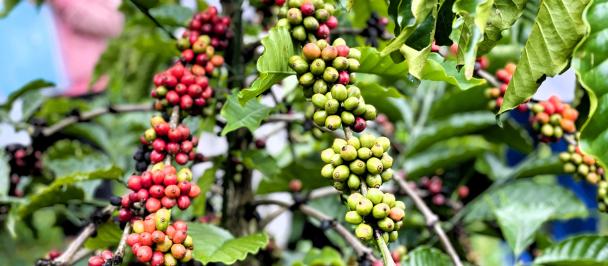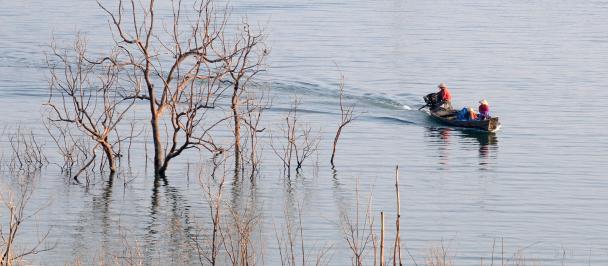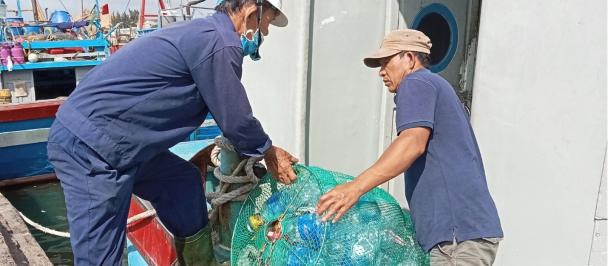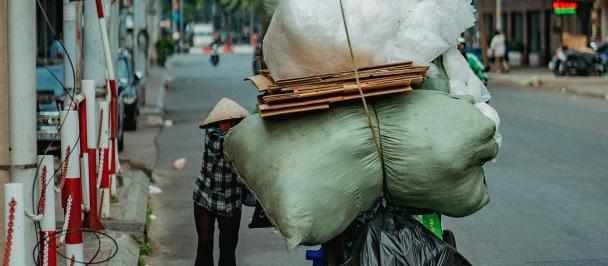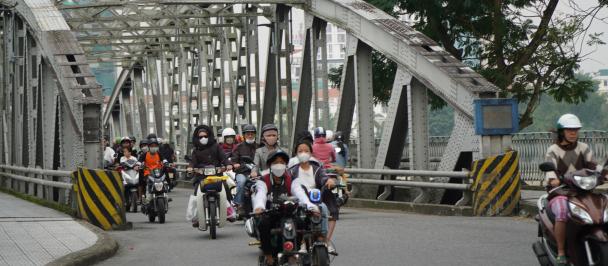Participants had a site visit and met women informal waste workers in Nhon Ly commune.
Quy Nhon, 14 April 2022 - The EU-BMZ 'Rethinking Plastics' project and UNDP Viet Nam co-hosted a workshop on “Lessons Learned from Pilot Projects Working with Women Informal Waste Workers in Viet Nam.” The workshop highlighted diverse case studies, researches and innovations from contributing to recognising the roles and contributions of informal waste workers in the waste management value chains.
During the workshop, the pilot activities in Quy Nhon, Ho Chi Minh City, Ha Long City, were introduced jointly with the non-profit organizations in charge of their implementation. They focused on strengthening the livelihoods of informal waste workers and supporting their recognition and/or inclusion in the waste management systems.
Attending the online and offline workshop in Quy Nhon were representatives from the Ministry of Natural Resources and Environment, the Delegation of the European Union to Vietnam, the Norwegian Embassy in Viet Nam, The Netherlands Embassy, the Department of Natural Resources and Environment and the People’s Committee of Quy Nhon, Vietnamese and international non-governmental organizations, the Women’s Union of Quang Ninh, Binh Dinh, Binh Thuan and Da Nang, and the informal waste workers.
On March 2nd, 2022, at the UN Environment Assembly, the world's ministers of the environment endorsed critical resolutions that established a foundation for introducing an international legally binding agreement to end plastic pollution. The roles of the informal waste workers have been recognised in an environmental resolution.
In Viet Nam, the government issued Decree No. 08/2022/ND-CP on January 10th, 2022, comprising chapters on waste management, Extended Producers Responsibility (EPR) and incorporating the roadmap for the circular economy. The introduction of a mechanism in the Law will reduce environmental leakages and generate additional financial flows for increased collection and recycling of packaging. The EPR may create opportunities and pose challenges for the collectors and aggregators.
The informal sector plays a pivotal role in Viet Nam's solid waste management system as over 30% of the waste is estimated to be collected through this channel. Knowledge of the role and the needs of informal networks in the waste management systems in Viet Nam is needed to prepare for their potential integration into the evolving national and international policy frameworks.
Speaking at the workshop, Ms. Caitlin Wiesen, UNDP Resident Representative in Viet Nam, highlighted “Recognizing, collaborating, supporting, and ultimately enhancing the roles and contributions of informal waste workers is key to strengthening local waste management systems. Combined with awareness campaigns and effective community mobilization, they are an essential part of the transition towards green and inclusive cities. To set a transition to a Just Circular Economy model in motion, UNDP will continue our work towards empowering women and generating a green, inclusive economic rebound.” She added that “Waste and plastic are, in fact, economic resources. We need to segregate, collect, and recycle our waste to fast-track the development of markets for secondary materials that are localized and inclusive of women workers at all stages.”
Mr. Ngo Hoang Nam, Quy Nhon People’s Committee said “It is an important workshop for us. We hope to receive many valuable ideas in waste management for practical applications and sound, creative suggestions for Quy Nhon city to implement the Law on Environmental Protection.”
According to Mrs. Fanny Quertamp, Senior Advisor Vietnam for Rethinking Plastics project, the mandatory EPR scheme for packaging which will be in force in 2024 is a major step generating opportunities and challenges for the waste collectors. The traceability of the packaging value chain that will be required will impact the current organization of the waste management and is an opportunity to integrate and recognize the collectors as contributors to the circular economy.
“I am very happy to join this workshop. I find this job helps me feed my family and contributes to keeping the environment clean. I look forward to participating in more workshops and activities. I will continue this useful work,” said Ms. Lê Thị Phú, Dĩ An, Bình Dương province.
At the workshop, mechanisms were collectively discussed to enhance the systematic collection of grassroots initiatives and strengthen their uptake at the policy level, and collaborate with other organisations to enhance the livelihoods of waste workers and recognize their critical roles in the transition towards a CE in Viet Nam.
Click here to read the issue brief
For more information, please contact:
UNDP:
Phan Huong Giang,
Media and Communications Analyst, Climate Change and Environment
Email: phan.huong.giang@undp.org; Mob: 0948466688
Rethinking Plastics project:
Fanny Quertamp
Senior Advisor Vietnam
Email: fanny.quertamp@expertisefrance.fr; Mob: 0904 26 77 13
-------
NOTES TO EDITORS
About ‘Rethinking Plastics - Circular Economy Solutions to Marine Litter’ project
The ‘Rethinking Plastics - Circular Economy Solutions to Marine Litter’ project is financed by the European Union (EU) and the German Federal Ministry for Economic Cooperation and Development (BMZ) and implemented in seven countries in East and Southeast Asia by Deutsche Gesellschaft für Internationale Zusammenarbeit (GIZ) GmbH and Expertise France. It focuses on promoting sustainable consumption and production, waste management, and the prevention of plastic waste entering into the marine environment.
The project has supported the Legal Affairs Department of the MONRE to elaborate the framework on EPR and financed a pilot project “Enhancing plastic packaging collection, sorting and recycling” in HCMC implemented by IRD and HAU. Additionally, a study has been conducted in 6 cities in Vietnam (Hanoi, HCM City, Buon Ma Thuot, Vinh, Danang, Nha Trang) to understand and assess the role of the different stakeholders of the plastic value chain in the perspective of EPR mechanism.
For more information about the Rethinking Plastics project: http://rethinkingplastics.eu/
About UNDP
The United Nations Development Programme is one of the most active organisations in activities to reduce marine plastic pollution in Viet Nam. In 2020, we launched the Ending Plastic Pollution Innovation Challenge (EPPIC), sourcing, incubating, and funding innovative solutions to issues of plastic pollution in coastal cities in ASEAN. Since 2020, UNDP has implemented the project “Scaling up a Socialised Model of Domestic Waste and Plastic Management” at coastal provinces and cities of Viet Nam. These projects are funded by the Government of Norway.
Last year, UNDP and MONRE launched the "Viet Nam Circular Economy Hub." The CE Hub (http://vietnamcirculareconomy.vn) aims to raise awareness and build the capacity of all stakeholders, including public authorities, businesses, civil society, academia, in adopting the principles of the circular economy, creating synergies, and integrating financial and technical resources to support the transition towards a low-carbon and circular Viet Nam.

 Locations
Locations